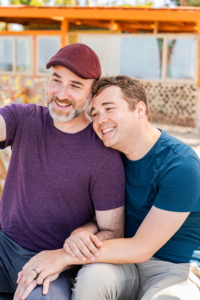What We Took Away from M2’s Experiential Learning Workshop
Learning from Experience to Shape What Happens Next
The Hive is a revolving door for experiences, whether it’s through our programming, workshops and events from our members or just daily interactions.
To kick off the new year, M2: The Institute for Experiential Jewish Education’s Chief Operating Office Heather Wolfson recently led a workshop in The Hive called “Learning from Experience: How to Shape What Happens Next.”
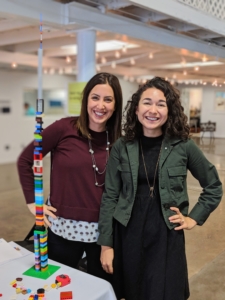
Heather (left) with Moishe’s Houses Megan Freeman
We began the workshop by building towers out of LEGOs. The challenge was to build the tallest, most stable tower and determine its value using a series of equations Heather gave us. We recognized that the exercise wasn’t the teaching tool; the takehome learning came from the experience with a time-based team activity.
She challenged us to think about what that experience made us feel. With answers ranging from “stressed” to “focused,” she led us into a conversation about what we could do with this knowledge in future team activities.
Before we knew it, Heather had led us through the first two phases of the Kolb cycle of experiential learning and we were already halfway through understanding it. The cycle, coined by David A. Kolb, outlines the learning process through a series of steps:
- Concrete Experience: Engaging in an experience, either physically, cognitively, spiritually or emotionally.
- Reflective Observation: Processing the experience, finding meaning and discovering your feelings about it.
- Abstract Conceptualization: Making realizations based off the experience and clarifying that new knowledge.
- Active Experimentation: Putting this realization into practice and testing it through action in the real world.
M2‘s values represent “Intention and Action,” and Heather’s workshop has inspired us to do both. We experiment a lot in our programming and are learning from experiences, whether they result in success or failure. Heather loves the idea of “failing upward” by seeking lessons from our experiences and building on them for the future.
You can apply Kolb’s cycle to any experience you face at work and learn from it. Practice the steps in your own work. Here are a few suggestions to help you start:
- Keeping a “failing upward” journal: catalog reflections and realizations from your interactions and projects. Make note of what you want to do differently next time. Look back at the journal over the course of a year and see your progress!
- Seek out critical feedback as vital opportunities for revealing areas for reflection and realizations. You might eventually crave such feedback if you make this a habit.
- Incorporate a reflective pause after your important interactions. Use the time to assess the experience, clarify your takeaways for yourself, and note when you can implement adjustments in the future.
Experiential learning happens every day in The Hive largely because we’ve become comfortable leaning into and adapting after failure. In his recent article in eJewishPhilanthopy, Moishe House’s Senior Director of Immersive Experiences Roey Kruvi mentions that our space is intentionally designed for innovation and collaboration, allowing room for failure because it will eventually breed success. If we lean into failure as much as we lean into success, then we will grow faster with abundant creativity and openness. .
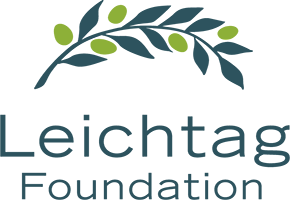


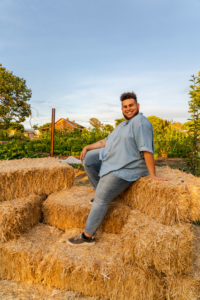 Black, Jewish and Queer. These three identities weave the fabric of who I am, but it took a long time to believe that they could exist together.
Black, Jewish and Queer. These three identities weave the fabric of who I am, but it took a long time to believe that they could exist together.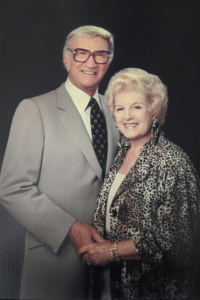 Lee and Toni Leichtag established the Leichtag Foundation in 1991 following the sale of their business. Lee and Toni were lifelong entrepreneurs with a passion for innovation and for supporting talent. They believed that only with big risk comes big reward. Both born to families in poverty, Toni to a single mother, they strongly believed in helping those most in need and most vulnerable in our community. While they supported many causes, their strongest support was for young children and the elderly, two demographics who particularly lack voice in our society.
Lee and Toni Leichtag established the Leichtag Foundation in 1991 following the sale of their business. Lee and Toni were lifelong entrepreneurs with a passion for innovation and for supporting talent. They believed that only with big risk comes big reward. Both born to families in poverty, Toni to a single mother, they strongly believed in helping those most in need and most vulnerable in our community. While they supported many causes, their strongest support was for young children and the elderly, two demographics who particularly lack voice in our society.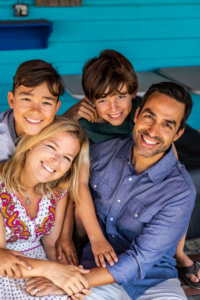 Lifelong Baltimoreans, Rabbi George and Alison Wielechowski and their sons, 11-year-old Lennon and 9-year-old Gideon, are more than pursuing the good life in Southern California. Having moved to San Diego more than three years ago, they are fulfilling a lifelong dream.
Lifelong Baltimoreans, Rabbi George and Alison Wielechowski and their sons, 11-year-old Lennon and 9-year-old Gideon, are more than pursuing the good life in Southern California. Having moved to San Diego more than three years ago, they are fulfilling a lifelong dream.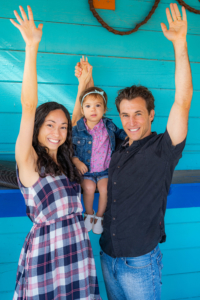
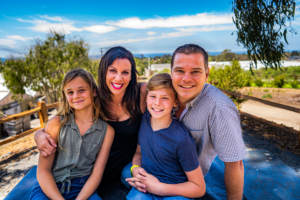
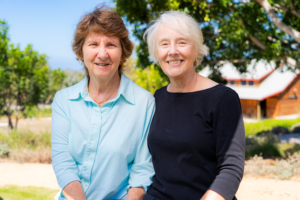
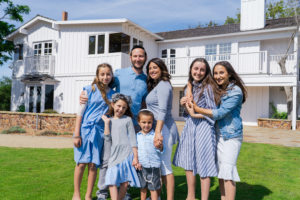
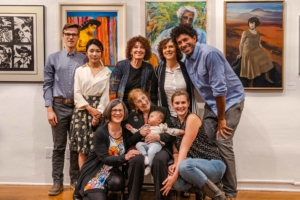
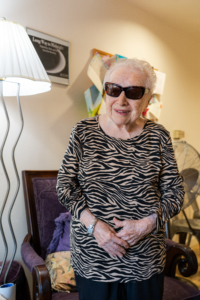
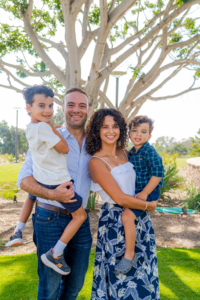
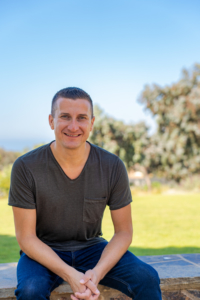 You would think that as the executive director of San Diego LGBT Pride, Fernando Zweifach López Jr., who uses the pronoun they, has done all the coming out they possibly can. A queer, non-binary individual who has worked for many years on civil rights issues, López also speaks openly and often about their father’s family, Mexican-American migrant workers who tilled the fields of rural California.
You would think that as the executive director of San Diego LGBT Pride, Fernando Zweifach López Jr., who uses the pronoun they, has done all the coming out they possibly can. A queer, non-binary individual who has worked for many years on civil rights issues, López also speaks openly and often about their father’s family, Mexican-American migrant workers who tilled the fields of rural California.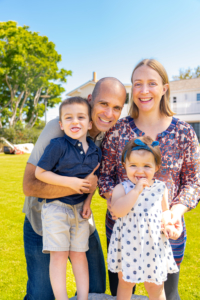 Stacie and Jeff Cook understand commitment. They live it.
Stacie and Jeff Cook understand commitment. They live it.